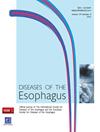398. DYSPHAGIA OR REGURGITATION AND ITS CORRELATES AMONG UP TO 10-YEAR ESOPHAGEAL SQUAMOUS CELL CARCINOMA SURVIVORS
IF 2.3
3区 医学
Q3 GASTROENTEROLOGY & HEPATOLOGY
引用次数: 0
Abstract
Background Dysphagia and regurgitation significantly impair the quality of life among survivors of esophageal squamous cell carcinoma (ESCC). Notably, the prevalence and associated factors of these symptoms in long-term survivors, particularly within Asian populations, remain underexplored. This study endeavors to bridge these critical knowledge gaps. Methods We evaluated the severity of dysphagia and regurgitation (mild, moderate, and severe), and their associations with clinical features and lifestyle factors among 512 10-year ESCC survivors who underwent ESCC radical surgery. Demographic, clinical, and lifestyle information was collected at study enrollment, which occurred 6 months post-surgery, and dysphagia and regurgitation was assessed at the 10-year post-surgery follow-up survey. Results In this study, 13.3% and 27.0% of participants reported dysphagia and regurgitation, respectively. Multivariable polytomous regression analysis revealed a significant association of dysphagia with upper thoracic esophageal carcinoma (mild dysphagia OR: 2.371, 95% CI: 1.051, 5.347) and postoperative radiotherapy and chemotherapy (mild dysphagia OR: 4.352, 95% CI: 2.168, 8.732; moderate/severe dysphagia OR: 3.651, 95% CI: 1.046, 12.745). An inverse relationship was observed between dysphagia and dietary quality as measured by the CHFP-2007 score (mild dysphagia OR: 0.458, 95% CI: 0.341, 0.615; moderate/severe dysphagia OR: 0.168, 95% CI: 0.089, 0.316). For regurgitation, positive associations were found with higher income level (mild regurgitation OR: 2.074, 95% CI: 1.020, 4.216), insomnia (moderate/severe regurgitation OR: 3.523, 95% CI: 1.127, 11.010), and use of Chinese patent medicine (mild regurgitation OR: 2.264, 95% CI: 1.279, 4.007). Conversely, age at surgery (moderate/severe dysphagia OR: 0.907, 95% CI: 0.848, 0.970) and higher dietary quality (mild dysphagia OR: 0.744, 95% CI: 0.606, 0.914; moderate/severe dysphagia OR: 0.406, 95% CI: 0.259, 0.634) showed protective effects against regurgitation. Conclusions The prevalence of dysphagia and regurgitation among long-term survivors of ESCC in China is high, underscoring a significant health concern. This study identifies critical correlates such as the tumor's anatomical site, the nature of postoperative interventions, dietary quality, socioeconomic standing, and concurrent health issues. These findings advocate for the integration of postoperative management approaches, including tailored dietary and lifestyle adjustments, aimed at mitigating these symptoms in long-term ESCC survivors.398.吞咽困难或反胃及其与长达 10 年的食管鳞状细胞癌幸存者的相关性
背景 吞咽困难和反胃严重影响食管鳞状细胞癌(ESCC)幸存者的生活质量。值得注意的是,这些症状在长期存活者中的发生率和相关因素仍未得到充分探索,尤其是在亚洲人群中。本研究旨在弥补这些重要的知识空白。方法 我们评估了 512 名接受 ESCC 根治手术的 10 年 ESCC 幸存者吞咽困难和反胃的严重程度(轻度、中度和重度)及其与临床特征和生活方式因素的关联。人口统计学、临床和生活方式信息是在手术后 6 个月登记研究时收集的,吞咽困难和反流是在手术后 10 年随访调查时评估的。结果 在这项研究中,分别有 13.3% 和 27.0% 的参与者报告了吞咽困难和反流。多变量多元回归分析显示,吞咽困难与上胸段食管癌(轻度吞咽困难 OR:2.371,95% CI:1.051,5.347)和术后放化疗(轻度吞咽困难 OR:4.352,95% CI:2.051,5.347)有显著相关性:4.352,95% CI:2.168,8.732;中度/重度吞咽困难 OR:3.651,95% CI:1.046,12.745)。根据 CHFP-2007 评分,吞咽困难与饮食质量之间存在反向关系(轻度吞咽困难 OR:0.458,95% CI:0.341,0.615;中度/重度吞咽困难 OR:0.168,95% CI:0.089,0.316)。就反流而言,收入水平较高(轻度反流 OR:2.074,95% CI:1.020,4.216)、失眠(中度/重度反流 OR:3.523,95% CI:1.127,11.010)和使用中成药(轻度反流 OR:2.264,95% CI:1.279,4.007)与反流呈正相关。相反,手术年龄(中度/重度吞咽困难 OR:0.907,95% CI:0.848,0.970)和较高的饮食质量(轻度吞咽困难 OR:0.744,95% CI:0.606,0.914;中度/重度吞咽困难 OR:0.406,95% CI:0.259,0.634)对反胃有保护作用。结论 在中国 ESCC 长期存活者中,吞咽困难和反胃的发生率很高,凸显了一个重要的健康问题。本研究发现了一些重要的相关因素,如肿瘤的解剖部位、术后干预的性质、饮食质量、社会经济地位以及并发的健康问题。这些发现提倡整合术后管理方法,包括量身定制的饮食和生活方式调整,以减轻 ESCC 长期存活者的这些症状。
本文章由计算机程序翻译,如有差异,请以英文原文为准。
求助全文
约1分钟内获得全文
求助全文
来源期刊

Diseases of the Esophagus
医学-胃肠肝病学
CiteScore
5.30
自引率
7.70%
发文量
568
审稿时长
6 months
期刊介绍:
Diseases of the Esophagus covers all aspects of the esophagus - etiology, investigation and diagnosis, and both medical and surgical treatment.
 求助内容:
求助内容: 应助结果提醒方式:
应助结果提醒方式:


